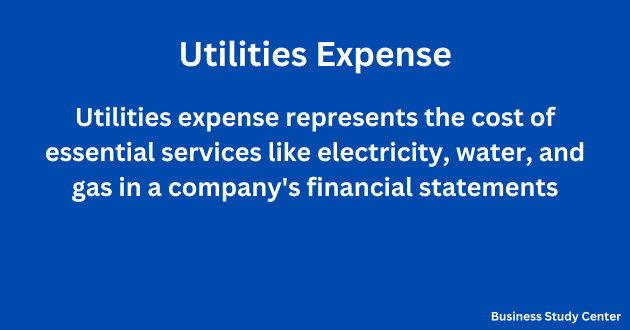
Introduction
Utilities are an essential part of our daily lives, ensuring that our homes and businesses function smoothly and comfortably. However, the cost of utilities can add up, impacting homeowners, landlords, and even renters. In this comprehensive guide, we will explore what utilities expenses are, how they are calculated, and provide tips on how to save money on your utility bills.
Understanding Utilities Expenses
Utilities expenses refer to the costs incurred by individuals or businesses for using services provided by public utility companies. These services typically include electricity, water, heating/cooling, trash/recycling, landline phone, and internet/cable. Utilities expenses are considered a significant component of the operating expenses (opex) for most businesses.
Calculating Utilities Expenses
When calculating utilities expenses, it is important to consider the specific services used and differentiate them from other expenses. Let’s take an example to illustrate this:
Suppose a company, Company Y Ltd, incurs the following expenses for the month of August 2019:
- Telephone Bills: $1,000
- Gas Bill: $500
- Rent Expenses: $2,400
- Salary Paid: $150,000
- Electricity Expenses: $1,100
- Water Charges: $350
To determine the total value of utility expenses, we consider the services provided by public utility companies. In this case, we would include the telephone bills, gas bill, electricity expenses, and water charges. Rent and salary expenses, on the other hand, do not directly involve the use of public utility services and are therefore not considered utility expenses.
By adding up the relevant expenses, we can calculate the total utilities expenses for Company Y Ltd:
Total Utilities Expenses = Telephone bills + Gas Bill + Electricity expenses + Water charges = $1,000 + $500 + $1,100 + $350 = $2,950
Factors Affecting Utilities Costs
Several factors can impact the cost of utilities for individuals and businesses. Understanding these factors can help you manage and control your expenses effectively. Here are some key factors to consider:
1. Location
The geographical location plays a significant role in determining utility costs. Areas with extreme climates may require higher usage of heating or cooling systems, resulting in increased utility bills. Additionally, transportation and infrastructure costs can also influence utility prices in certain regions.
2. Resource Usage
Your personal or business usage of resources, such as electricity and gas, directly affects your utility expenses. Conserving energy by adjusting thermostat settings, turning off lights when not in use, and using energy-efficient appliances can help reduce your utility bills.
3. Energy Efficiency
The energy efficiency of your home or business premises can impact utility costs. Proper insulation, energy-efficient windows, and modern appliances can help prevent energy loss and reduce utility expenses in the long run.
4. Size and Layout
The size and layout of your property also play a role in utilities costs. Larger homes generally require more heating, cooling, and lighting, resulting in higher utility bills. Open floor plans may increase heating and cooling costs compared to compartmentalized spaces that allow for more targeted temperature control.
Other Non-Energy-Related Utilities and Costs
While energy-related expenses form a significant part of utilities costs, there are other non-energy-related utilities to consider as well. Let’s explore some of these:
1. Trash/Recycling
Curbside trash and recycling services are often included in city or town fees. However, those paying independently should budget an average of $10-$40 per month for these services.
2. Water
Water expenses can vary depending on location and usage. According to research by Circle of Blue, American households spent an average of $15-$77 per month on water in 2016.
3. Landline Phone
Although many people rely on mobile phones, landline phone services are still used by some individuals or businesses. The cost of a landline phone service can range from $15-$45 per month, depending on the provider and additional services like long-distance calling.
4. Internet/Cable/Phone
Internet, cable, and phone services are often bundled together. The average cost of a triple package is around $165 per month, while internet and cable services without the phone can cost around $132 per month. Alternatively, online media-streaming services are becoming popular and offer a more affordable option, with an average cost of $10 per month.
Tips to Save Money on Utilities
Reducing your utility costs can help you save money in the long term. Here are a few tips to help you lower your utility bills:
1. Choose Energy-Efficient Appliances
When purchasing new appliances, look for the Energy Star label. Energy Star appliances meet or exceed federal energy efficiency standards and can significantly reduce energy consumption and utility expenses.
2. Improve Insulation and Windows
Proper insulation and energy-efficient windows can prevent energy loss and reduce heating and cooling costs. Consider upgrading your insulation or installing double-pane windows to improve energy efficiency.
3. Optimize Lighting Usage
Switching to energy-efficient bulbs and turning off lights when not in use can save money on your utility bills. Consider using smart bulbs that can be controlled remotely, allowing you to turn off lights even when you’re away from home.
4. Be Mindful of Resource Usage
Being mindful of your resource usage can significantly impact your utility expenses. Adjusting thermostat settings, using natural light whenever possible, and conserving water can all contribute to lower utility bills.
Conclusion
Utilities expenses are an essential aspect of our daily lives, whether at home or in business operations. Understanding what constitutes utilities expenses and how they are calculated can help individuals and businesses manage their budgets effectively. By implementing energy-saving practices and being mindful of resource usage, it is possible to reduce utility costs and save money in the long run. Remember, every little effort to conserve energy and reduce waste can make a significant difference not only in your utility bills but also in building a more sustainable future.


